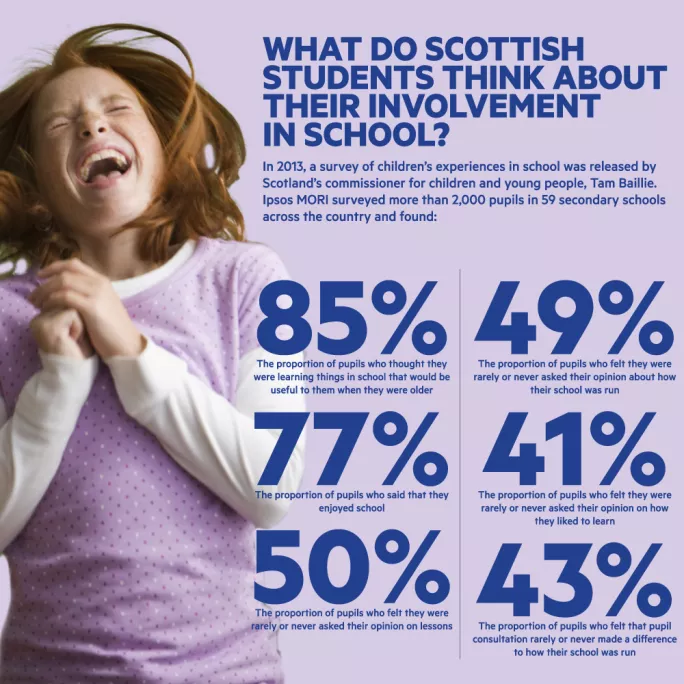Inspectors ask students to judge their schools

Pupils should be involved in evaluating the quality of the teaching that takes place in their school, inspectors have said.
School inspections this year will have an increased focus on how well schools engage with pupils - and their parents - after the criteria upon which schools are judged were updated.
The update came with the publication of Education Scotland’s latest version of its school self-evaluation tool, How Good is Our School? 4 (HGIOS 4). A forthcoming child-friendly version of the document, due to be published early next year, will set out how students can get involved in actually evaluating their teaching.
Pupils will become “actively involved in shaping their education and provide teaching staff with valuable insight”, according to officials (see box, “Pupils ‘will provide valuable insight’”, below). Children’s judgements on their schools will not be used by inspectors to form overall judgements, but are expected to provide useful information for teachers.
Schools inspector Patricia Watson outlined the changes at a recent workshop. While there had been recent improvements in the area of pupil voice, she said, too often lengthy pupil consultations were carried out that never led anywhere or students were asked to comment in dialogue that stopped short of discussing learning and teaching.
Young people should be involved in conversations about “the nuts and bolts of what is really important and impacting on their attainment, achievement, wellbeing and skills development”, she said.
There will be teachers who find it difficult and who say they don’t want pupils telling them how to teach or questioning their teaching, she acknowledged. But a school in Angus has shown that it can work, Ms Watson said. There, pupils observed lessons and gave feedback (see box, “‘Children see things with fresh eyes’”, below) after designing their own version of HGIOS 4, called Wee HGIOS.
‘We value pupils’ views’
Speaking at the Scottish Learning Festival in Glasgow last month, Ms Watson said: “Placing a high value on children’s views has been developing over the past five or six years. We are seeing more engagement with pupil councils. Still, what we don’t see enough of with these sorts of conversations is a focus on learning and teaching.
“We want young people involved in conversations about the nuts and bolts of what is important and impacting on their attainment, achievement, wellbeing and skills development.”
Scotland’s children’s commissioner, Tam Baillie, meanwhile, told TESS that he was “disappointed” by the level of consultation schools engaged pupils in. A survey commissioned by his office found that half of students said they were rarely or never asked their opinion about their lessons (see graphic, below).

But the idea of pupils judging lessons has not been welcomed universally. The proposal was “nonsense” and had the potential to undermine teachers’ authority, Seamus Searson, the general secretary of the SSTA teaching union, said.
“If you are getting an observation you need people trained to do the job, and asking young people to do that is nonsense,” he said.
“It’s one thing to have a headteacher going into a lesson and observing but even then there are concerns some senior managers have not been trained to do that in a positive and constructive way.”
Larry Flanagan, general secretary of the EIS teaching union, meanwhile, said that pupils carrying out “crits” of teachers’ lessons was unacceptable; he questioned whether they would have the skills to evaluate what was going on. However, feedback from pupils was welcome, he added.
Mr Flanagan said: “Getting feedback is critical to evaluating the success of a lesson. The key issue with any proposals is that they are subject to open discussion and agreement in schools. But the idea that pupils are somehow going to ‘crit’ teachers is unacceptable.”
You need a Tes subscription to read this article
Subscribe now to read this article and get other subscriber-only content:
- Unlimited access to all Tes magazine content
- Exclusive subscriber-only stories
- Award-winning email newsletters
Already a subscriber? Log in
You need a subscription to read this article
Subscribe now to read this article and get other subscriber-only content, including:
- Unlimited access to all Tes magazine content
- Exclusive subscriber-only stories
- Award-winning email newsletters